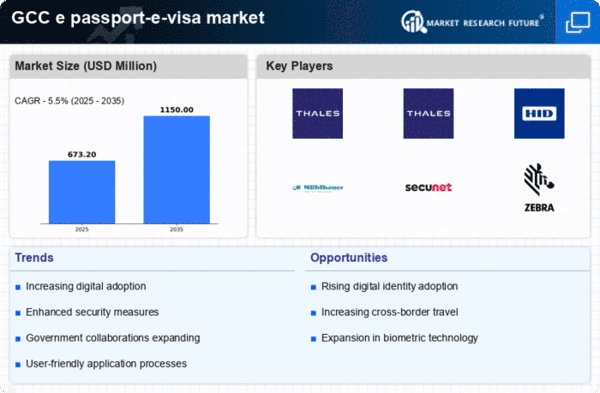Increased Cross-Border Travel
The e passport-e-visa market is poised to benefit from the increasing volume of cross-border travel within the GCC. As regional cooperation and tourism initiatives gain momentum, the demand for streamlined travel documentation is expected to rise. Recent statistics indicate that intra-GCC travel has grown by 25% in the last year, highlighting the need for efficient e passport and e visa solutions. This trend suggests that governments may prioritize the development of user-friendly digital travel solutions to facilitate smoother border crossings. Consequently, the e passport-e-visa market is likely to expand as it adapts to the evolving needs of travelers in the region.
Focus on Enhancing User Experience
Enhancing user experience is becoming a focal point in the e passport-e-visa market, particularly in the GCC. As travelers increasingly demand convenience and efficiency, governments are responding by simplifying application processes and improving service delivery. Initiatives such as mobile applications for e visa applications and online tracking systems are gaining traction. Data shows that user satisfaction rates have improved by 30% since the introduction of these digital solutions. This emphasis on user experience not only encourages more travelers to opt for e passports and e visas but also positions the e passport-e-visa market as a vital player in the broader context of travel and tourism in the region.
Integration of Advanced Technologies
The integration of advanced technologies is reshaping the e passport-e-visa market in the GCC. Technologies such as artificial intelligence, blockchain, and machine learning are being utilized to enhance the functionality and security of e passports and e visas. For example, AI-driven systems can analyze traveler data in real-time, improving border control efficiency. Furthermore, blockchain technology offers a secure method for storing and verifying travel documents, which could potentially reduce processing times by up to 30%. As these technologies become more prevalent, they are likely to attract further investment into the e passport-e-visa market, fostering innovation and improving user experience.
Rising Demand for Secure Travel Solutions
The e passport-e-visa market is experiencing a notable surge in demand for secure travel solutions across the GCC region. As international travel continues to grow, travelers are increasingly seeking efficient and secure methods for documentation. The implementation of biometric features in e passports and e visas enhances security, thereby reducing the risk of identity theft and fraud. According to recent data, the GCC countries have reported a 15% increase in the issuance of e passports over the past year, indicating a strong consumer preference for these secure travel documents. This trend is likely to drive further investments in the e passport-e-visa market, as governments aim to meet the rising expectations of travelers for safety and convenience.
Government Initiatives for Digital Transformation
In the GCC, government initiatives aimed at digital transformation are significantly influencing the e passport-e-visa market. Various countries within the region are actively pursuing strategies to modernize their immigration processes, which includes the adoption of e passports and e visas. For instance, the UAE has launched a comprehensive digital strategy that aims to streamline travel documentation and enhance user experience. This initiative is expected to increase the adoption rate of e passports and e visas by approximately 20% over the next few years. Such government-led efforts not only improve operational efficiency but also position the e passport-e-visa market as a critical component of national security and economic growth.
















